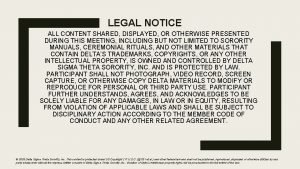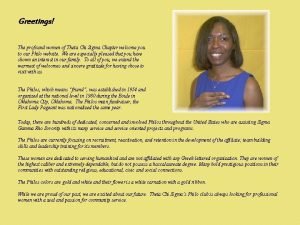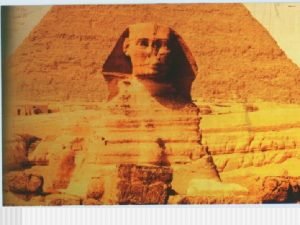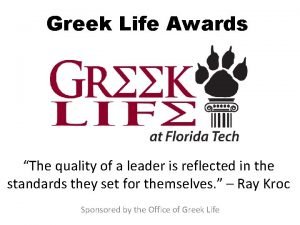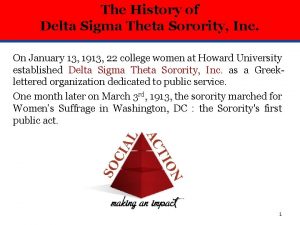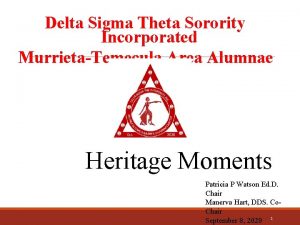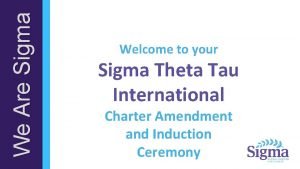Delta Sigma Theta Sorority Inc North San Diego




















- Slides: 20

Delta Sigma Theta Sorority, Inc. North San Diego Alumnae Chapter HERITAGE MOMENT PATRICIA P WATSON Ed. D JANUARY 13, 2017

January’s Heritage Moment Celebrates Honorary Delta Fannie Lou Hamer

Early Years • Civil rights activist Fannie Lou Hamer was born Fannie Lou Townsend on October 6, 1917, in Montgomery County, Mississippi. She was the grand daughter of a slave and the youngest of 20 children. Her parents were sharecroppers in the Mississippi Delta area. Hamer began working the cotton fields when she was only 6 years old on the plantation of W. D. Marlow. • She attended school in a one-room schoolhouse on the plantation, from 1924 to 1930.

Around the age of 12, Soror Hamer dropped out of school in order to work full-time and help out her family. In 1944 she was married to Perry "Pap" Hamer. The couple worked on a cotton plantation near Ruleville, Mississippi. They were unable to have children after Soror Hamer had a surgery to remove a tumor. During the operation, her surgeon gave her a hysterectomy without her consent.

Go Tell it on the Mountain… During the 1950 s, Soror Hamer attended several annual conferences of the Regional Council of Negro Leadership (RCNL) in the all-Black town of Mound Bayou, Mississippi. The RCNL, a combination civil rights and self-help organization, was led by Dr. T. R. M. Howard, a civil rights leader and wealthy Black entrepreneur. On August 23, 1962, Rev. James Bevel, an organizer for the Student Nonviolent Coordinating Committee (SNCC) and an associate of Dr. Martin Luther King, Jr. , gave a sermon in Ruleville, Mississippi. He followed it with an appeal to those assembled to register to vote. Since 1890, most Blacks had been disenfranchised in Mississippi by a constitution and laws that raised barriers to voter registration by assessing a poll tax, literacy and comprehension tests assessed by White registrars. In the late 1950 s and early 1960 s, Black people who tried to register to vote in Mississippi and other southern states faced serious hardships due to institutionalized racism, including harassment, loss of their jobs, and physical attacks and death. Fannie Lou Hamer was the first volunteer to respond to Bevel's call.

Ain’t Gonna Let Nobody Turn Me Around… • But such bravery came at a high price for Soror Hamer. She was fired from her job and driven from the plantation she had called home for nearly two decades—just for registering to vote • Soror Hamer dedicated her life to the fight for civil rights, working for the Student Nonviolent Coordinating Committee (SNCC). During the course of her activist career, she was threatened, arrested, beaten, and shot at.

This Little Light of Mine, I’m Gonna Let it Shine… In the summer of 1964, the Mississippi Freedom Democratic Party, was organized with the purpose of challenging Mississippi's all-White and anti-civil rights delegation to the Democratic National Convention, which failed to represent all Mississippians. Hamer was elected Vice-Chair. The Freedom Democrats' efforts drew national attention to the plight of Blacks in Mississippi, and represented a challenge to President Lyndon B. Johnson, who was seeking the Democratic Party’s nomination for reelection; their success would mean that other Southern delegations, who were already leaning toward Republican challenger Barry Goldwater, would publicly break from the convention's decision to nominate Johnson — meaning that he would almost certainly lose those states' electoral votes. Hamer, singing her signature hymns, drew a great deal of attention from the media, enraged Johnson, who referred to her when speaking to his advisors as "that illiterate woman".

Soror Hamer was invited, along with the rest of the MFDP officers, to address the Convention's Credentials Committee. She recounted the problems she had encountered in registration, and the ordeal of the jail in Winona. Near tears, she concluded: “All of this is on account we want to register to become first-class citizens, and if the Freedom Democratic Party is not seated now, I question America. Is this America, the land of the free and the home of the brave where we have to sleep with our telephones off the hooks because our lives be threatened daily because we want to live as decent human beings — in America? ”

Lyndon Baines Johnson President Johnson, fearful of the power of Hamer's testimony on live television, called an emergency press conference in an effort to divert press coverage. Still, many television networks ran Hamer's speech unedited on their late news programs. The Credentials Committee received thousands of calls and letters in support of the Freedom Democrats. Johnson then arranged for several Democratic Party operatives to attempt to negotiate with the Freedom Democrats, including Senator Hubert Humphrey (who was also campaigning for the Vice Presidential nomination), Walter Mondale, Walter Reuther and J. Edgar Hoover. They suggested a compromise that would give the MFDP two nonvoting seats in exchange for the endorsement of Martin Luther King, Jr. and the Southern Christian Leadership Conference. But when Humphrey outlined the compromise, saying that his position on the ticket was at stake, Hamer, invoking her Christian beliefs, sharply rebuked him:

I’m going to Pray to Jesus for You! Do you mean to tell me that your position is more important than four hundred thousand Black people's lives? Senator Humphrey, I know lots of people in Mississippi who have lost their jobs trying to register to vote. I had to leave the plantation where I worked in Sunflower County, Mississippi. Now if you lose this job of Vice. President because you do what is right, because you help the MFDP, everything will be all right. God will take care of you. But if you take [the nomination] this way, why, you will never be able to do any good for civil rights, for poor people, for peace, or any of those things you talk about. Senator Humphrey, I'm going to pray to Jesus for you.

A Change is Gonna Come… Future negotiations were conducted without Soror Hamer, and the compromise was modified such that the Convention would select the two delegates to be seated "at-large", with no voting rights. The MFDP rejected the compromise, with Hamer making the famous quote: “We didn't come all the way up here to compromise for no more than we’d gotten here. We didn't come all this way for no two seats when all of us is tired. ” In 1968 the MFDP was finally seated, after the Democratic Party adopted a clause which demanded equality of representation from their states' delegations. The Democrats agreed that in the future, no delegation would be seated from a state where anyone was illegally denied the vote. A year later, President Johnson signed the Voting Rights Act. In 1972, Fannie Lou Hamer was elected as a national party delegate.

Continuing the Struggle • In 1964 and 1965 Soror Hamer ran for Congress, but failed to win. She continued to work on other projects, including grassroots-level Head Start programs, the Freedom Farm Cooperative in Sunflower County, and Martin Luther King, Jr. 's Poor People's Campaign. • She sought equality across all aspects of society and was involved with the founding and operation of the Freedom Farm Cooperative in 1969 that helped poor families raise food and livestock

This Little Light of Mine; I’m gonna’ let it shine. . Fannie Lou Hamer ran for the Mississippi Senate in 1971 against the incumbent, Robert Crook. She campaigned with Carver Randle, an NAACP leader in Indianola who was running for the state House of Representatives. The pair ran on a platform urging that state and local governments hire more minorities for jobs previously held by Whites, and to appoint more minorities to government positions. She lost the election, 11, 770 votes to 7, 201.

Launch of the Freedom Farm Cooperative

Great minds…. Sorors Fannie Lou Hamer and Joan Trumpauer Mulholland join fellow SNCC activists during the Mississippi Freedom Summer campaign, 1964. Courtesy of Wallace Roberts / Jewish Women’s Archive.

Fannie Lou Hamer, in hat with placard, leads a “Freedom Day” voting rights march in front of Forrest County courthouse, Hattiesburg, Mississippi, January 22, 1964. The SNCC campaign sought to register hundreds of African. Americans in the county to vote, at a time when not a single Black person was registered there. Courtesy of the Mississippi Department of Archives and History.

Fannie Lou Hamer, seated at left, at a meeting of the Mississippi Freedom Labor Union, a union of Black domestic workers and day laborers. Photograph courtesy The Tougaloo College Civil Rights Collection at the Mississippi Department of Archives and History Hamer lifts banner at the 1964 National Democratic Convention. Photograph by Fred De. Van. Photograph courtesy The Tougaloo College Civil Rights Collection at the Mississippi Department of Archives and History

Fannie Lou Hamer received several awards and honors including: Honorary Degrees of Doctorate of Humanities from Tougaloo College and Shaw University; Honorary Degrees from Columbia College and Howard University. She was honored with the National Sojourner Truth Meritorious Service Award, the Paul Robeson Award from Alpha Kappa Alpha Sorority, and the Mary Terrell Award from Delta Sigma Theta, Inc. In 1977, just before her death, Fannie Lou Hamer became an Honorary Member of Delta Sigma Theta Sorority, Inc. She was inducted into the National Women Hall of Fame. On February 18, 1995, The United States Post Office in Ruleville, Mississippi was named in Fannie Lou Hamer's honor thanks to Congressman Bennie Thompson. An Extraordinary, Ordinary Woman…

Most Famous Quote… I’M SICK AND TIRED OF BEING SICK AND TIRED………. Soror Fannie Lou Hamer we will always remember your contribution to our treasured history!

References • Deltasigmatheta. org/ heritage and archives • Wikipedia https: //en. wikipedia. org/wiki/Fannie_Lou_Hamer • http: //gdc. gale. com/archivesunbound • Mississippi Freedom Democratic Party
 Delta sigma theta san diego
Delta sigma theta san diego Delta sigma theta san diego
Delta sigma theta san diego Lillian benbow with these hands
Lillian benbow with these hands Dorothy height delta sigma theta
Dorothy height delta sigma theta Delta sigma theta convention 2023
Delta sigma theta convention 2023 Delta sigma theta denver
Delta sigma theta denver Fannie lou hamer delta sigma theta
Fannie lou hamer delta sigma theta San diego continuing education north city campus
San diego continuing education north city campus Phi delta theta university of oregon
Phi delta theta university of oregon Delta theta ratio
Delta theta ratio Delta gamma theta vega rho
Delta gamma theta vega rho Theta chi sigma
Theta chi sigma Theta mu
Theta mu Sorority superlatives
Sorority superlatives Sorority extension
Sorority extension Wavesync tulane
Wavesync tulane Lyman beta
Lyman beta Alpha kappa alpha membership intake process manual
Alpha kappa alpha membership intake process manual Amy tan sorority
Amy tan sorority Official sorority jewelry
Official sorority jewelry Bornes de transformador
Bornes de transformador


